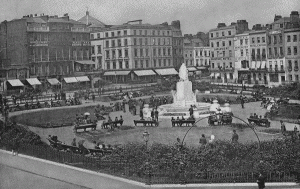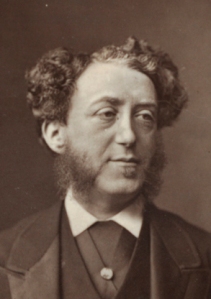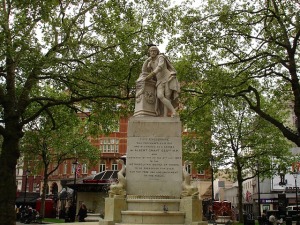Few Londoners know how close they once came to losing Leicester Square.
 Without Baron Albert Grant it would have been ‘Farewell Leicester Square’ in 1874, when the private gardens that we know as the square were earmarked to build a department store. The square had been plunging downmarket since the previous century, when the likes of Joshua Reynolds and Isaac Newton took the air around its pretty enclosed garden. It had become latterly a fearsomely smelly rubbish dump by day and a trysting place by night for loose ladies working the theatre district. The government already tried to buy it, but backed off when politicians found out how high the bill would be.
Without Baron Albert Grant it would have been ‘Farewell Leicester Square’ in 1874, when the private gardens that we know as the square were earmarked to build a department store. The square had been plunging downmarket since the previous century, when the likes of Joshua Reynolds and Isaac Newton took the air around its pretty enclosed garden. It had become latterly a fearsomely smelly rubbish dump by day and a trysting place by night for loose ladies working the theatre district. The government already tried to buy it, but backed off when politicians found out how high the bill would be.
The saviour of the square had an inauspicious start in life. In December 1831, a boy was born in Dublin’s tiny Jewish community. The father Berton Gottheimer, a refugee from Prussian Poland and his wife Julia from Portsmouth, were so poor that members of the synagogue had to provide baby Abraham with blankets.
When he died in August 1899 Abraham Gottheimer had metamorphosed into Baron Albert Grant. In between, he had become easily one of Britain’s richest men. Forgotten now, literally hundreds of newspapers around the world carried his obituary, describing how England’s cleverest financier of the Victorian age had made and lost millions of pounds in dubious schemes. How rich was Albert Grant? Rich enough to buy Leicester Square, just to donate it to the people.
 Some said that ‘Baron’ Grant (the title was real enough, though an Italian one; bestowed by the King of Italy for financing the construction of Milan’s magnificent shopping arcade, the Galleria Vittorio Emanuele), made this extravagant gesture just to secure himself a British peerage or at least a knighthood.
Some said that ‘Baron’ Grant (the title was real enough, though an Italian one; bestowed by the King of Italy for financing the construction of Milan’s magnificent shopping arcade, the Galleria Vittorio Emanuele), made this extravagant gesture just to secure himself a British peerage or at least a knighthood.
Critics added that Grant’s unseemly haste to have the public unveiling ceremony in the square in July 1874 was a race against time to make sure that the fountain of Shakespeare in the middle of the square should bear for all time the legend ‘donated by Albert Grant MP’, before Grant’s election win that January was overturned. Liberal opponents fixed it  that he was expelled for ‘bribing’ the voters with Conservative blue ribbon and a 1,000 halfpenny buns.
that he was expelled for ‘bribing’ the voters with Conservative blue ribbon and a 1,000 halfpenny buns.
Albert Grant was a ‘company promoter’. Grant was paid an eye-wateringly large management fee for orchestrating public offerings on mines, railways, waterworks and docks around the world. Some of this fee would be paid in shares at par value — shares which he then trickled onto the market while he massaged the company’s prospects in the newspapers. If you got into and out of a Grant float in good time the rewards were huge. If you stayed in too long you lost a fortune.
During the Leicester Square ceremony someone — probably a disgruntled investor — hired sandwich board men to parade around the ceremony with a scandalous poem then doing the rounds in the City; their boards proclaiming that “…title without honour is a barren grant”.
Before marketing tools such as PR and direct selling were invented, Grant’s back office staff kept thousands of hand-written cards with the names and addresses of Britain’s new middle class. Grant tapped into their greed by targeted prospectus mailings – an unbelievable 80,000 in one day, claimed a contemporary. Grant was servicing the age-old impulse for speculative greed. Grant said: “I know hundreds who would rather make £50 on the Stock Exchange than £250 by the exercise of their profession.”
While his parents remained in the Jewish faith and were buried just a row apart in the now-disused and overgrown Ball’s Pond Road Cemetery, Albert, like many others of his generation converted and married out. You could say he did it for love — as it was just six months before his marriage that he was baptised in 1855. The evidence shows that from then on his parents were as dead to him as he was to them and communication was negligible thereafter. Both he and his brother and partner Maurice became staunch protestant Christians.
The casual anti-Semitism of the day targeted at successful Jews would not let Grant be, however. The press used coded epithets to describe him, such as ‘the German’ or more directly as ‘the Hebrew’. There were those that went even further. The writer Anthony Trollope (not without his prejudices) was said to have modelled his arch villain Augustus Melmotte on Grant.
Grant was twice an MP; He was an innovative media owner, buying a Liberal newspaper and re-launching it as a Tory organ. He was an inveterate art collector, often sending a cheque for the equivalent of £250,000 a month to his art dealers. He was the builder of ever larger houses. Despite his Victorian-sized family of 12 children, the houses he built were always too big. Grant’s greatest folly was a 100-room mansion on an 11 acre site in Kensington High Street which he never lived in before financial ruin overtook him. The locals dubbed it ‘Swindle Villas’.
Grant was never accused of criminal wrongdoing, while plenty of other businessmen of that era were. When the tide turned against him a year or so after his gift of Leicester Square, he faced a procession of civil suits, usually from shareholders who regretted their foolishness and wanted a way to get their money back.
When Grant called in the receivers in 1879 he was universally written off as a broken man facing penury, but critics were wrong. Grant had quietly parked a huge amount of money in his wife’s name. He retired to his fourth house, a 33 acre pile near Bognor. Grant continued dabbling in speculation for a further 20 years and faced nominal bankruptcies twice more before dying of heart disease in 1899.
Grant spent around £30 million in today’s money buying, fencing, lighting and landscaping the Square. Just for good measure of his generosity, he threw in a major portrait from the Victorians’ favourite painter Edwin Landseer of Sir Walter Scott, which is in the National Portrait Gallery.
He still did not get his knighthood.
